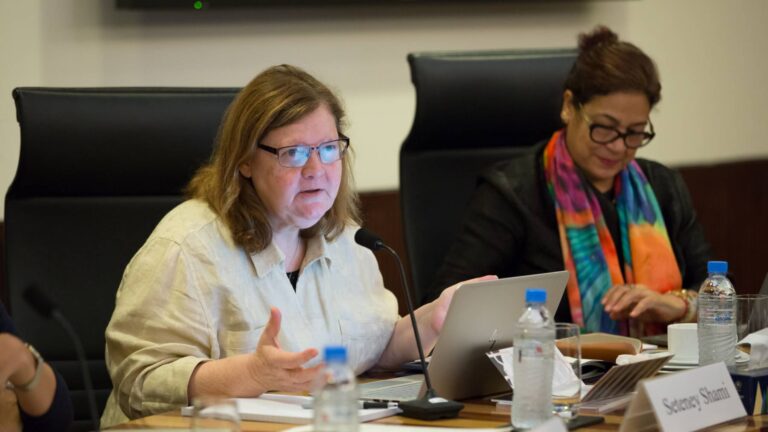Focused Discussions, Race & Society, Regional Studies
Supporting Social Science Research in a Turbulent Middle East Roundtable Meeting

On November 29, 2017, CIRS convened a one-day roundtable meeting to bring together scholars of the region with extensive experience in carrying out social science research, to have an in-depth conversation on the topic of “Supporting Social Science Research in a Turbulent Middle East.” Over the course of a day experts engaged in a vibrant and open conversation on how the research community can address the multiple challenges encountered when carrying out studies on the Middle East.
Among other things, participants in the focused discussion discussed the value, replicability, and statistical significance of Middle Eastern case-studies; methodological issues relating to the merits of quantitative and qualitative research, as well as the potential usefulness of alternative methodological approaches adapted to conflict zones; data challenges due to lack of existing data or lack of access to (and confidence in) existing data; challenges of supporting and funding safe fieldwork in societies and countries that are in the midst of war or facing authoritarian clamp-downs; challenges related to censorship and academic freedom; the impact of restrictions and immigration controls that limit travel and free mobility of researchers both within the region and from the region to the West, limit research collaboration across borders, and diminish access to participation in international conferences; the role of the ever evolving sanctions regime and the constraints of funding or working with scholars in states which have sanctions imposed upon them; and finally the whole host of ethical and moral challenges related to protecting researchers, protecting informants, protecting scholars at risk, protecting sensitive data, protecting vulnerable communities, and protecting the rights of scholars trying to carrying out “sensitive research” that confront social values and norms in some parts of the Middle East. In the introduction to our meeting, we urged scholars participating in the discussion to not only highlight and reiterate the difficulties and dismal prospects for social science research in the Middle East, but to also help us understand their own experiences in navigating challenges, and identify for us what the possibilities for managing this difficult time are.
Key points that emerged out of the discussions were:
- Conditions for social science research in MENA region are particularly challenging due to region-wide restrictions on academic freedom, increasing securitization and rigid control of the social sciences under authoritarian regimes, the existence of deeply divided societies, social sensitives that limit research topics, and the impact of US sanctions regime
- The academic community of social science scholars in and of the MENA region is weak and not unified. There is a need for greater development of region-wide network of social scientists who can work with and support each other.
- Mechanisms for integrating ethical concerns into social science research projects are not effective. Institutional Review Boards are only there to oversee initial proposal submissions, but there are serious shortcoming when it comes to maintaining ethics throughout the research process. Among other things discussed were the social science researcher’s obligations to ensure that his or her research is used responsibly, and also avoiding making false promises and raising the hopes of research subjects by promising that the study will make a real-life difference.
- Complicated and oppositional ideas of the role of the social science researcher working in the Middle East. Some participants insisted that prioritizing and maintaining scientific objectivity is the most important thing that social scientists can do. Others had very different ideas and suggested social science researchers also have a mandate to “do good” and contribute towards the improvement or betterment of problematic conditions.
It is worth mentioning that CIRS will publish the findings of the roundtable meeting in the near future.
- Read more about the research initiative
Participants and Discussants:
- Abdullah Al-Arian, Georgetown University in Qatar
- Zahra Babar, CIRS – Georgetown University in Qatar
- Abdallah Badahdah, Doha International Family Institute
- Laurie A. Brand, University of Southern California
- Afyare Elmi, Qatar University
- Michael Ewers, Qatar University
- Justin Gengler, Qatar University
- Suzanne Hammad, Qatar University
- Islam Hassan, CIRS – Georgetown University in Qatar
- Islah Jad, Qatar University
- Mehran Kamrava, CIRS – Georgetown University in Qatar
- Milli Lake, London School of Economics
- Beverley Milton-Edwards, Queen’s University Belfast
- Suzi Mirgani, CIRS – Georgetown University in Qatar
- Firat Oruc, Georgetown University in Qatar
- Mary Schmiedel, Georgetown University
- Seteney Shami, Arab Council for the Social Sciences
- Shaida Sonde, Georgetown University in Qatar
- Jackie Starbird, CIRS – Georgetown University in Qatar
- Elizabeth Wanucha, CIRS – Georgetown University in Qatar
- Valbona Zenku, Georgetown University in Qatar
Article by Zahra Babar, Associate Director of Research at CIRS